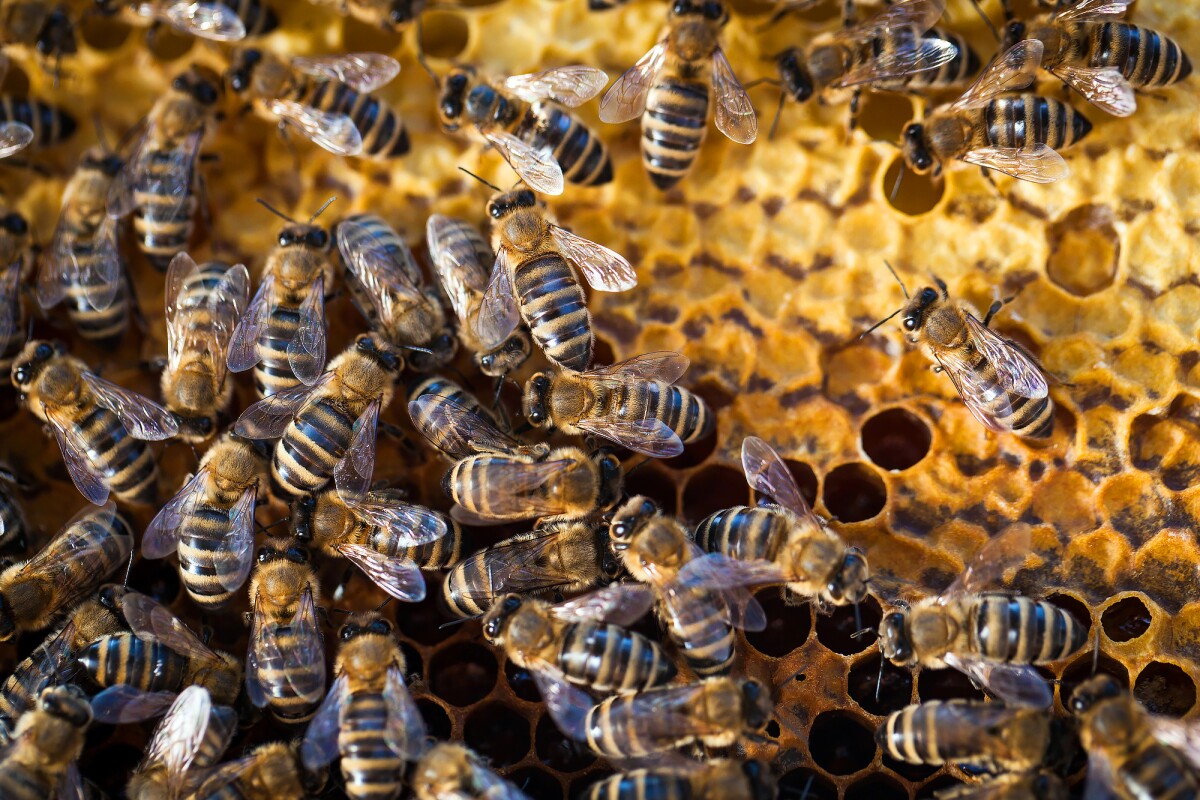
We all know that hives buzz if tapped and it makes peerfect sense to use this as an obvious diagnostic. monitor temperature while you are at it.
It is thus plausible to safely rig a hive comm to your cell phone or computer to watch hive health.
It may well turn out to be good enough and this may also extend to colony collapse syndrome.
What is good news is that the industry has become lareger thanks to you and I wanting it to happen and making it accessable.
Beekeepers can now check hives without upsetting the residents
By Paul McClure
March 06, 2024
Recording bees' response to a gentle tap can indicate the health of a colony
https://newatlas.com/biology/tap-honeybee-colony/
Delivering a gentle automated tap to the outside of a hive and recording the honeybees’ collective response can give an indication of the colony's health without having to look inside, new research has found.
At last check, there were an estimated 115,000 to 125,000 beekeepers in the US, most of whom were hobbyists. In particular, ownership of honeybee colonies appears to have risen in recent years, with amateur apiarists wanting to help preserve these powerful pollinators in addition to generating their own source of sweet, sticky goodness.
But caring for honeybees can be tricky. Colonies follow very specific activity patterns throughout the year; they should be very busy in warmer months and idle when it’s cold. So, they need to be checked regularly for health and productivity. Beekeepers can inspect hives by opening them, but this invasive process risks harm to the colony, particularly the all-important queen.
A new study led by researchers from Nottingham Trent University in the UK suggests they have a solution: gauging health by gently tapping the hive and listening for the bees’ collective response.
“It’s a bit like a bear that falls asleep for the winter; sometimes, you cannot tell if the animal is alive or not,” said Martin Bencsik, the study's lead and corresponding author. “A gentle tap, causing a tiny, but measurable reaction, will reveal whether the animal is in its normal state or not.”
The researchers’ ‘gentle tap’ was delivered at random times by an electromagnetic shaker attached to a hive’s outer wall, driven by a computer that provided a 0.1-second pulse at 340 Hz. The honeybees’ response was recorded by an accelerometer embedded in the middle of the hive’s frame, which was sensitive to the insects’ vibrations.
In the summer months, the researchers found that healthy colonies paid little attention to the pulse as the bees were too busy foraging for food, caring for their young and maintaining the hive. Other than freezing momentarily when they heard it, the bees’ response signal was almost absent as they went about their business. The response signal was stronger as winter arrived and then disappeared again with the warmer spring weather. To the researchers, the winter response indicated that the colony was clustered together for warmth and was healthy.
One of the nine colonies the researchers examined developed serious health deterioration and was the only one to consistently exhibit a strong, easily measurable, long-lived buzzing response throughout the summer while the colony was slowly declining. Although they couldn’t generalize, the researchers hope this signal might indicate “at least some health disorders, at least in the active season.”
“In the winter, the bees should be very restful and in the summer they should be very mobile, unless they are unwell,” said Bencsik. “Our pioneering method also allows us to test for mobility, revealing another aspect of the health and physiological status of the colony inside the hive. Our measurements reveal, non-invasively, colony mobility, the clustering of the colony and its restfulness, and can detect the absence of the queen in the active season.”
The researchers say their method objectively measures colony health from inside the hive. As far as they’re aware, it’s the first investigation to demonstrate a phenomenon similar to a group ‘reflex arc,’ something that’s not been seen in invertebrates. In vertebrates, the reflex arc provides a quick, involuntary response to potentially harmful external stimuli. An example would be automatically jerking your hand away from a hot stove.
“Some beekeepers knock on their hives with their hand, in the winter, to check and listen for a positive buzzing response to indicate the liveliness of the colony,” Bencsik said. “Until now, however, the potential relevance of this simple test had never been looked into carefully.”
The researchers think that the strength of the response signal may also give beekeepers an indication of the size of their colonies. And it’s hoped their study will lead to the development of a device that relays real-time information to beekeepers about colony health so they can be managed better.
The study, which also involved researchers from Ghent University, Belgium, and Portugal’s Coimbra University, was published in the journal Scientific Reports.
Source: Nottingham Trent University
No comments:
Post a Comment